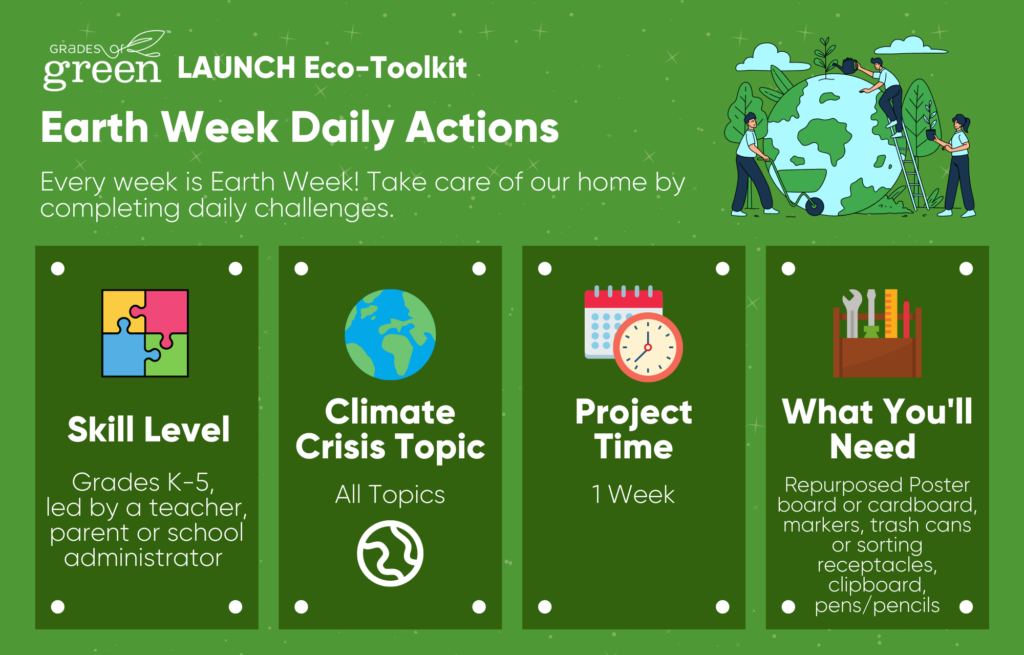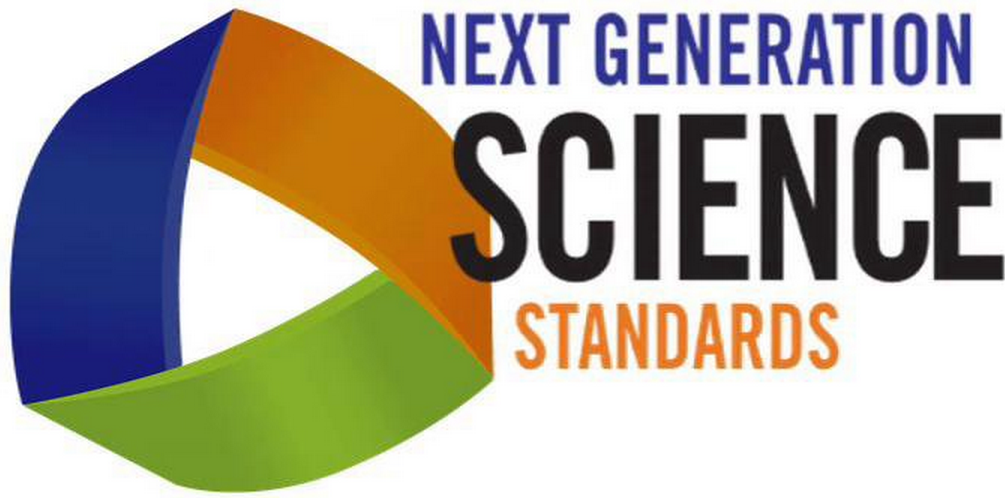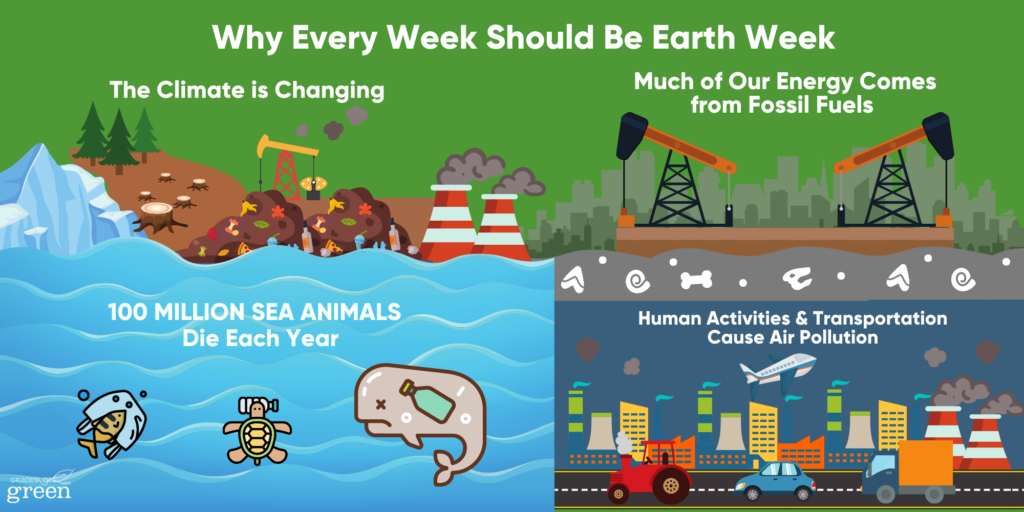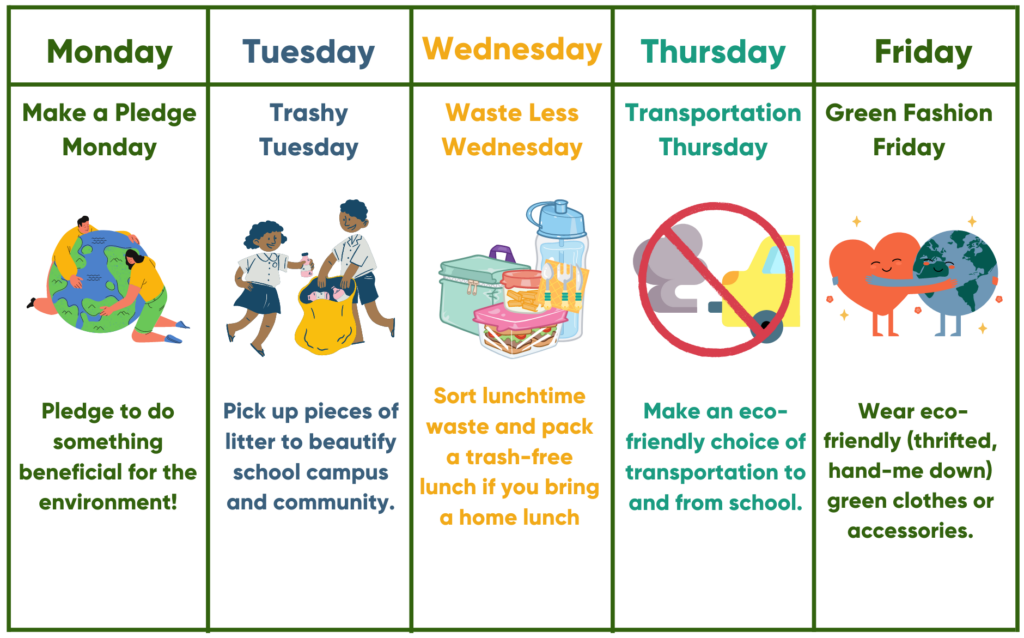Every week is Earth Week!
This LAUNCH toolkit provides simple daily actions and activities that can be implemented at your school or in your classroom during Earth Week or any week, because as we say at Grades of Green… every week is Earth Week!

Toolkit Details


NGSS
This toolkit address the following Science and Engineering Practices (SEPs) within the Performance Expectations of NGSS for Grades: K-2 and 3-5
- Asking Questions and Defining a Problem
- Planning and Carrying out Investigations
- Analyzing and Interpreting Data
- Using Mathematics and Computational Thinking
- Constructing Explanations and Designing Solutions
- Obtaining Evaluating, and Communicating Information
Learning Objectives
- Analysis
- Students will analyze their school and environmental footprint
- Project Management
- Students will practice leadership skills by delegating tasks to each other
- Students will keep track of their positive environmental impact
- Evaluation and Assessment
- Students will track and evaluate the impact of their project
Why Is Earth Week Important?
Earth Day was founded in 1970 for the purpose of educating people about environmental issues. We now celebrate Earth Week as a time to take action and/or encourage others to take action towards a greener planet. It can also be a great time to take on a new eco habit!
What You Will Accomplish
Students will learn about the Climate Crisis and complete at least 5 actions to alleviate the impact they have on Earth.
Educator Project Plan
Follow the steps below to set up a successful Earth Week at your school! Need help? Contact us!
Track your metrics and submit your impact after implementing this toolkit. Your feedback helps keep our programs free for all across the globe.
Determine Participants
Use the Earth Week Sign Up Sheet to have participants sign up (optional).
- A Student Group such as (a club, before/after school program, non-school organization)
- A whole class
- The whole school
Working with different group sizes?
- A student group– plan to have these students take all of the actions and present their experiences
- A class or multiple classes– have each class take on a different action and/or be in charge to gain participants for each daily action
- The Whole School – Have a core group of students promote the daily activities and track the results or create a competition between classes for each daily activity
- Teachers can also use this toolkit as a daily resource during Earth Week – make sure to click on the “Supplemental Education Guide” each day for infographics, facts, and videos supporting that day’s activity.
Create positions, roles, and committees to help organize students
Why Should You LAUNCH Earth Week?
The resources provided can be shown as a slideshow or printed out as individual worksheets for students to learn.

The Climate is Changing
Due to human activity, global temperatures have risen 1 degree celsius in the last century. Our actions have led to melting polar ice caps, world-wide habitat destruction, and rising sea levels. If humankind does nothing to alleviate our negative impacts on the planet, these issues could become irreversible. That’s why it’s up to us to take action and fight climate change. [1]
Waste
Trash in our environment hurts our health and the health of animals because it leaves behind chemicals and tiny pieces of plastic. Each year, over 1 million land animals and 100 million sea animals die because they eat or get stuck in pieces of trash. For humans, those chemicals and pieces of plastic can get into our air and water. They can even get into the soil where we grow our food. [2]
Energy
Today, energy sources such as oil, coal, and gas make up 80% of our energy use. They are called “fossil fuels,” and their use often releases chemicals and greenhouse gasses into the air. This causes air pollution and makes the air hotter, which is called global warming. [3]
Transportation Choices
Cars are one of the biggest polluters of fossil fuels on earth which means walking/biking to school can greatly help. On top of the personal benefits of walking/biking to school, taking this action also helps the people around you. Roughly 10-14% of cars in the morning are students/student’s parents making their way to campus. In the United States alone, that is roughly 14 million cars everyday! [4]
Taking care of the planet is an Environmental Justice Issue
Environmental justice is defined as the “fair treatment and meaningful involvement of all people regardless of race, color, national origin, or income with respect to the development, implementation, enforcement of environmental laws, regulations, and policies” by the Environmental Protection Agency. Some individuals feel the effects of climate change more than others based on where they live. For example, communities that are located near landfills and oil refineries feel the negative effects of climate change more than others. This is really common in communities housing the BIPOC (Black, Indigenous, People of Color) population and communities with lower income levels.
[1] https://climate.nasa.gov/news/2865/a-degree-of-concern-why-global-temperatures-matter/
[2] https://www.epa.gov/trash-free-waters/impacts-mismanaged-trash
[3] https://www.eia.gov/todayinenergy/detail.php?id=45096#:~:text=In%202019%2C%2080%25%20of%20domestic,consumption%20originated%20from%20fossil%20fuels.
[4] http://www.walkbiketoschool.org/learn-more/why-walkbike/
Watch these two short videos to learn why it’s important to care for the planet!
Think About It!
Pre-Activity Questions
- What environmental issues do you see at your school?
- How can these issues be addressed by hosting Earth Week activities at your school?
- What are some organizations you can connect with to support your Earth Week activities and events?
Take Action: How to LAUNCH Your Earth Week
Lead students through the “Earth Week” activity with guided instructions. Check out “Pro Tips” with each step for useful help:
1. Gain Participants
Determine who and how many students/staff are participating using the Earth Week Sign-Up Sheet or create a team from an existing group of students such as a class or Student Council. A whole class or the whole school can also participate!
- Have a group of students lead their classmates in each activity
- Host an Earth Week class or grade competition to see which class has the best results at the end of the week.
- Offer prizes such a extra recess, lunch with the principal or a gift card to a local business
2. Organize Participants
If you are working with a group of lead students, separate student/staff participants into groups based on the daily activity they’d like to lead most:
- Make a Pledge Monday
- Trash Free Tuesday
- Waste Less Wednesday
- Transportation Thursday
- Green Fashion Friday
Collaborative work will allow them to discuss ideas and get help from one another. Use the Earth Week Daily Activity Group Organizer to complete this.
If the whole school is participating, identify a student representative(s) from each class to track daily activities and progress.
3. Promote!
One to two weeks before Earth Week, use this e-flier so students, faculty and parents know what to expect. Some places to use the flier:
- School newsletter
- Teacher newsletter
- Print and hang around campus
4. Plan Your Daily Activity
Based on their groups, student leaders can follow the steps to prepare and plan for the daily activity they are leading.

Make a Pledge Monday
On Make a Green Pledge Monday, students and faculty can each pledge to do something beneficial for the environment. Use this Supplemental Education Guide to learn why making a pledge is so important!
Take Action:
- Create your “Pledge Board”
- Reuse materials you already have such as the backside of a poster board or poster board or cardboard (try your best to reuse something you already have for your Pledge Board!)
- Plan when and where you want to have the pledge board available. For example at recess and/or lunch? Before/After school? Will you have a table set up with markers to help students and promote Earth Week?
- Have all the student groups write down their pledges with markers to inspire other students (make sure they’re different!)
- I will pick up trash around campus or at the beach when I see it.
- I will walk (or wheel) to and from school whenever I can.
- I will use a reusable water bottle at school and practice.
- I will take a reusable bag when I go shopping for food or clothes.
- I will sort my lunch waste carefully each day.
- I will remind my parents not to idle in their car longer than 10 seconds.
- Make announcements to let the school know when and where to find the Pledge Board and encourage them to sign it.
- Today/______(first day of Earth Week) is the first day of Earth Week! With the help of the non-profit, Grades of Green, we will be taking a different action everyday this week to help the earth and learn why it’s important to take care of the Earth.
- Today/Monday is Green Pledge Day and taking ACTION big or small to help the environment. Even small actions, when taken together, can have a BIG impact.
- Making a Pledge to protect the planet is one the best ways to get more people involved with the environment. By pledging to take actions like reducing your plastic use, saving water or walking instead of driving when possible, you can show your commitment to creating a healthier earth and inspire others as well. Collaboration is not just beneficial, but necessary to protect the planet on a global scale.
- Join us today/on _________(date) at ______________(time) in ______________(location – ex: quad, cafeteria, classroom, every class, etc) to make your Green Pledge!
- Find a prominent place on campus to display the finished Pledge Board so students can see it all week.
- Have the Earth Week flier on display so the students can get inspired and curious by the daily activities
REMINDERS:
- Total up the number of students and faculty who wrote pledges on the Pledge Board.
- Include this number in your LAUNCH Toolkit Wrap-Up form at the end of Earth Week
Trashy Tuesday
On Trash Free Tuesday, students will learn why trash and litter can be harmful for the environment. Students will pick up pieces of litter to beautify their campus and community. Use this Supplemental Education Guide to learn why picking up litter is so important! For even more inspiration, guidance and resources, check out the Adopt-a-Spot LAUNCH Toolkit!
Take Action:
- Get permission to have all students pick up litter on Tuesday during Earth Week
- Determine when students will pick up litter:
- All at recess?
- During class time? Think about planning a different time for each grade level so all students are not all out at the same time.
- Where will students pick up litter? Each grade level can clean a different area such as:
- Lunch area
- Playground
- Front of school
- Various halls
- Garden area
- How will students pick up litter?
- Ask students to bring gloves
- Provide or ask for trash grabbers
- Have trash cans or trash bags accessible in each area
- Make announcements to let the school know when and where the litter pick up will take place
- The theme for today/Tuesday is Trashy Tuesday. As a school, we will be picking up litter and beautifying our campus.
- Why is picking up litter important? Scientists found that there are more than 13 thousand pieces of litter for every mile of American roadway. All together, there are about 51 billion pieces of litter on all US roads at any moment. When you count all of the trash in the ocean, there are more pieces of plastic in the seas than there are stars in the galaxy.
- Join us on ____________(date) at ______________(time) in your assigned location to pick up litter!
Use this worksheet to track how much litter you pick up and include this number on your wrap up form at the end of Earth Week.
Waste Less Wednesday
On Waste Less Wednesday, students will pack a trash free lunch and sort their lunchtime waste. Use this Supplemental Education Guide to learn why reducing and sorting our waste is so beneficial for the environment.
For even more inspiration, guidance, and resources check out the Trash Free Lunch and Lunchtime Sorting LAUNCH Toolkits!
Take action:
- Trash Free Lunches: for students who pack a lunch
- Before Wednesday, encourage students who pack a lunch to have no trash in their lunch. Examples:
- Reusable lunchbox, napkin, utensils, and water bottle
- Fruit and veggie scraps don’t count as trash! They can be composted, if available.
- Celebrate the wins – even one reusable item is a great start!
- Before Wednesday, encourage students who pack a lunch to have no trash in their lunch. Examples:
- Lunchtime Sorting: for students who get a school lunch
- On a day before setting up the sorting station- count how many landfill bags are filled at lunch (this is how you will know how much trash you diverted from the landfill on Waste Less Wednesday!
- Before Wednesday’s lunch, set up a Waste Sorting Station for those who get lunch from the cafeteria or have a small amount of waste in their packed lunch. Repurpose trash cans you already have on campus by covering them with different colored paper to show what they are being used for.
- Share box for sealed, uneaten cafeteria food that can be shared with other students or donated
- A liquid bucket for leftover milk/juice so the carton can be recycled (a custodial or construction bucket works great for this!)
- A recycle bin (can use a trash can covered in blue paper or decorated to show it’s for recycle)
- Compost for fresh fruit and veggie scraps (check if your school site has organic waste removal available!)
- Stack trays to stack cafeteria trays neatly so they take up less room in the landfill or recycle (use a desk or box to keep trays stacked neatly).
- Landfill (trash can) for anything leftover such as wrappers, leftover food, etc.
- Make announcements to let the school know how they will be making less waste
- The theme for today is Waste Less Wednesday. Creating a lot of waste is bad for the earth. Did you know the average amount of trash a student in the US creates is about 67 pounds per school year?? That’s more than 18,000 pounds for the average size elementary school – equal to about the weight of 2 elephants!
- So today we will be working on making less waste at lunchtime by sorting it and reducing it!
- (If you want to include an incentive) If you are “caught green handed” by sorting your waste correctly or having a reusable item in your packed lunch, you’ll get _________ (examples: hand stamp, raffle ticket, etc)!
Use this worksheet to track waste diverted from the landfill. Include this number on your wrap up form at the end of Earth Week.
Transportation Thursday
On Transportation Thursday, students can make an eco-friendly choice of transportation to and from school. Use this Supplemental Education Guide to learn why transportation choices affect air quality and how they can improve the air quality.
Use the No Idle Zone and Stroll n’ Roll LAUNCH Toolkits for even more information, guidance, and resources!
Take action:
- Encourage students and parents to turn off their cars!
- Those who live close to school can walk, ride a bike or scooter to school with a parent or friend
- For those who have to drive, turn your car off in drop-off and pick up lines to reduce your carbon footprint and create cleaner air around the school.
- Choose to park farther from school so you can join in with other classmates in walking, biking, or scooting!
- Have student monitors tally how many cars were turned off and did not idle at drop off and pick up and how many students walk, biked, or scootered to and from school
- Make announcements to let the school know how their families’ transportation choices affect the environment:
- The theme for today is Transportation Thursday.
- Did you know that studies at school’s have shown that many parents leave their cars on when waiting to pick up their students and there are high levels of air toxics during these afternoon pickup times. Children’s lungs are especially sensitive to air pollution, limiting idling can dramatically reduce these pollutants and children’s exposure to them.
- It’s time to turn your car off by not idling at school drop-off and pick-up or getting out of your car completely and “stroll or roll” to school!
Use this worksheet to track participants and include this number on your wrap up form at the end of Earth Week.
Safety is our priority!! Please be careful when traveling to and from school. Be sure to obey traffic signs, stay on sidewalks/designated bike paths, look out for traffic and stay alert. If in doubt, please ask your parent/guardian or school faculty for guidance.
Green Fashion Friday
On Green Fashion Friday, students can celebrate by wearing green clothing and accessories that are thrifted, hand-me-down, second hand, or even borrowed! Students should come together to choose one (or more!) green activity that they will adopt going forward. Learn about more Eco-Projects that students have done with this Supplemental Education Guide.
Take Action:
- Plan an assembly or lunchtime event for students to show off their green fashion
- Display the Pledge Board from Monday
- Let a few students from each grade level share their favorite green activity and why they’re excited for their new eco habit
- CELEBRATE!
- Use your tracking worksheets to share the success the school had during Earth Week. Examples: Create a poster board to share your results, make a slideshow to share at an assembly, display the results so the students can see how impactful their actions all week have been
- Submit your “Wrap Up” form below to share your results with Grades of Green!
- Keep up the good work all year round and make every week Earth Week!
Reflection Questions
How’d It Go?
- Which day had the most participants?
- What are some other ways you can “go green” at school?
- How would you talk to a friend or family number about this project?
- What personal changes will you make to reduce your impact on climate change?
Report Students’ Impact
Congratulations!! You’ve implemented Earth Week Activities! Don’t let all that hard work go unnoticed. Submit your results by clicking the green button below.
Project ongoing? No problem! Let us know what you’ve done so far.
By reporting your impact, Grades of Green can:
- CELEBRATE and elevate your students’ hard work and success.
- Offer our programs FREE for all students across the globe.
- AWARD stipends and certificates to hard-working educators and students.
Please take a few minutes to submit your results. Thank you!
Provided Resources
Worksheets
Fliers
Congrats on completing the Earth Week Eco-Toolkit!
Did you enjoy this toolkit? Find your next project here!